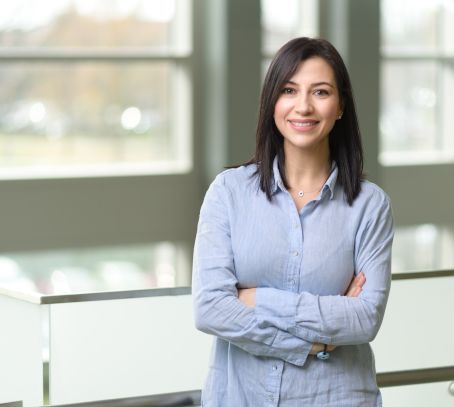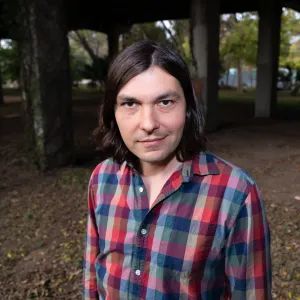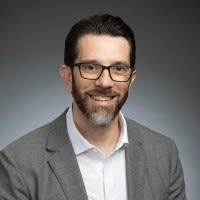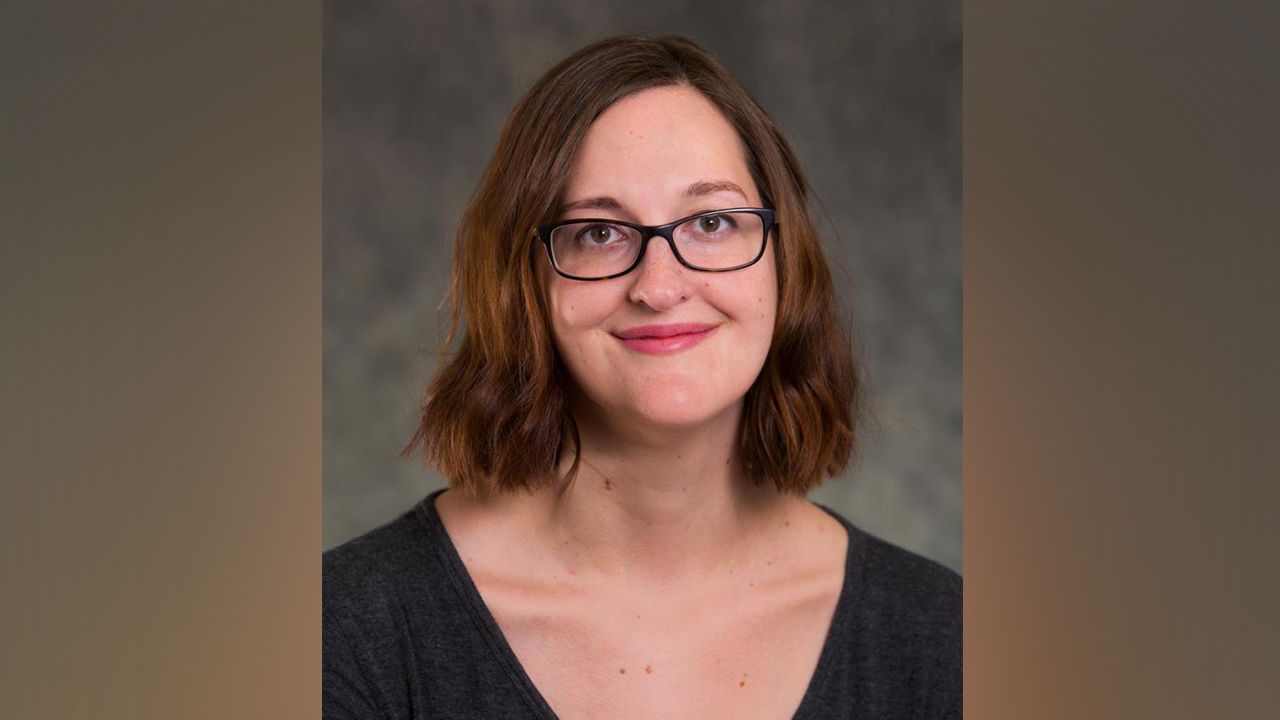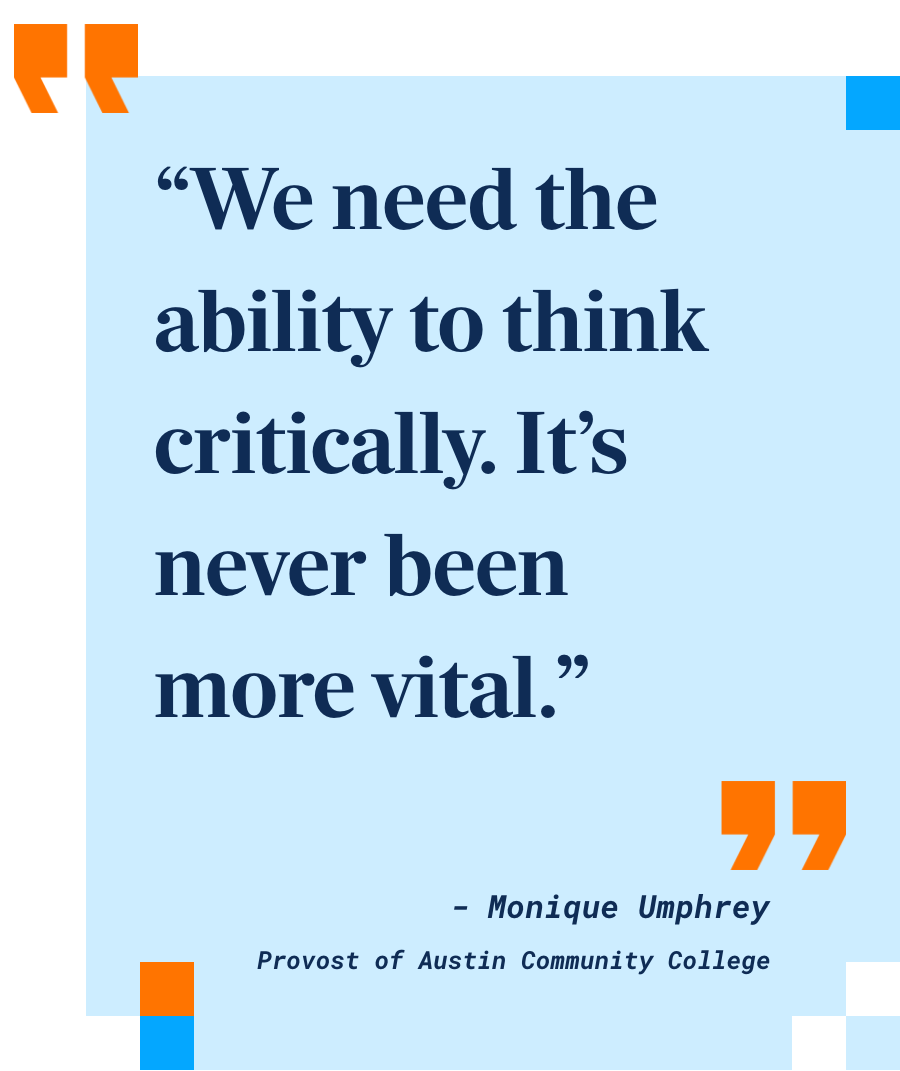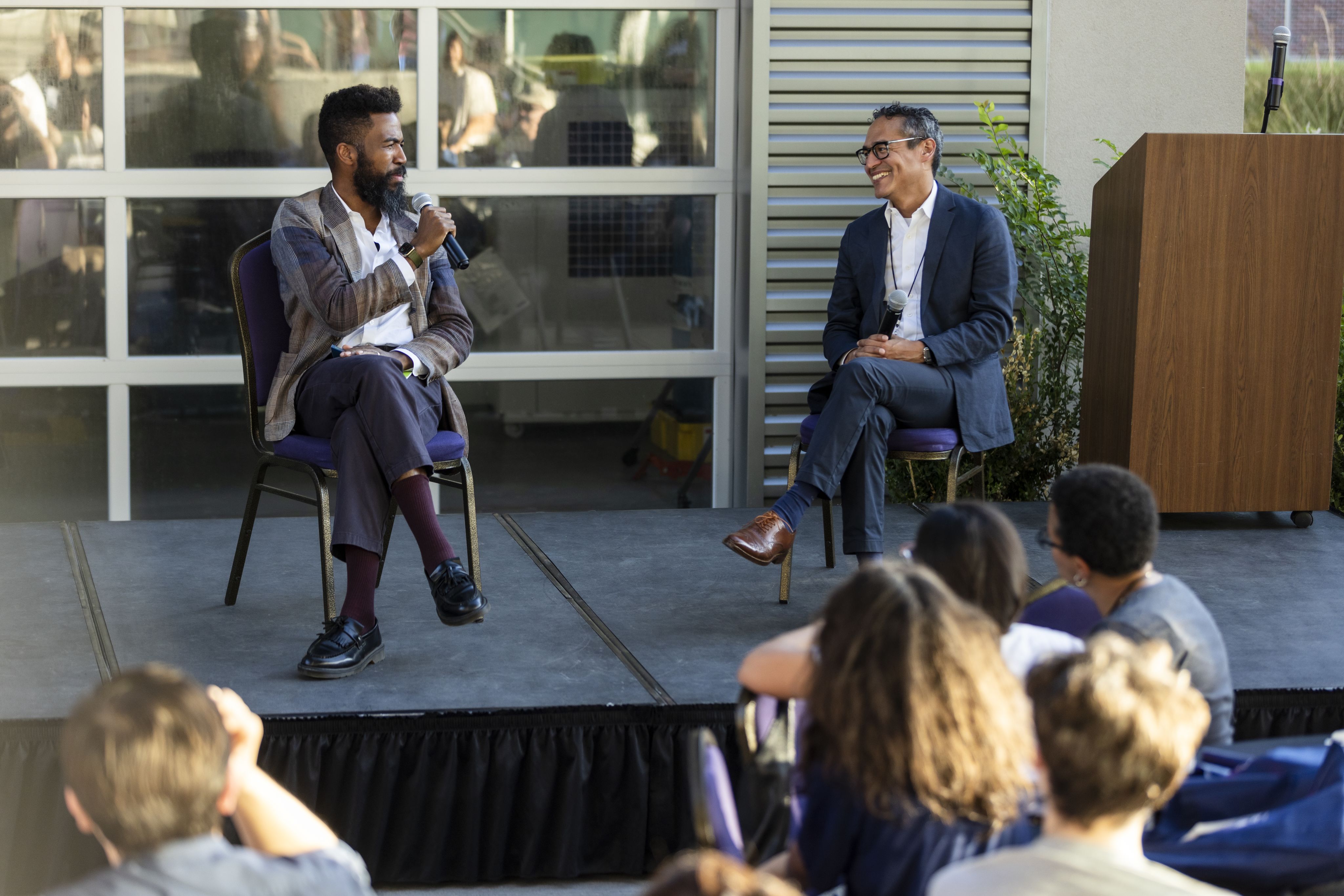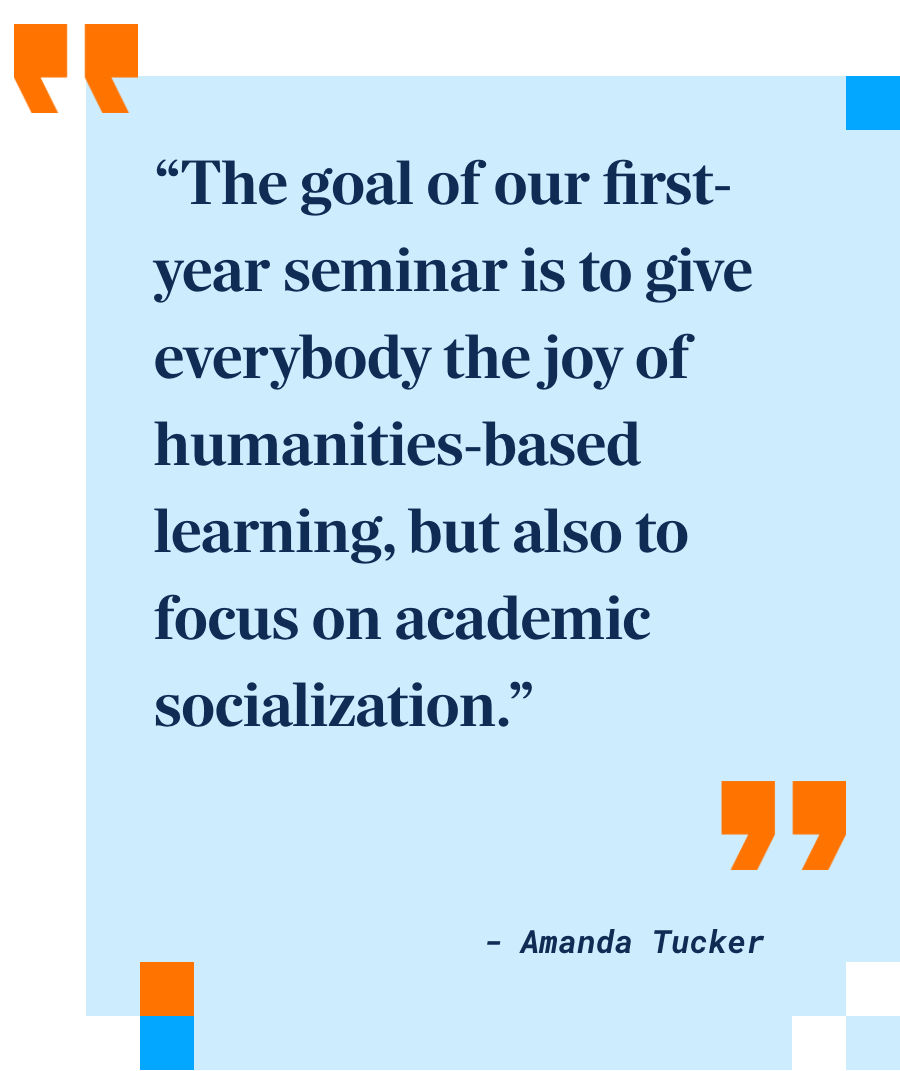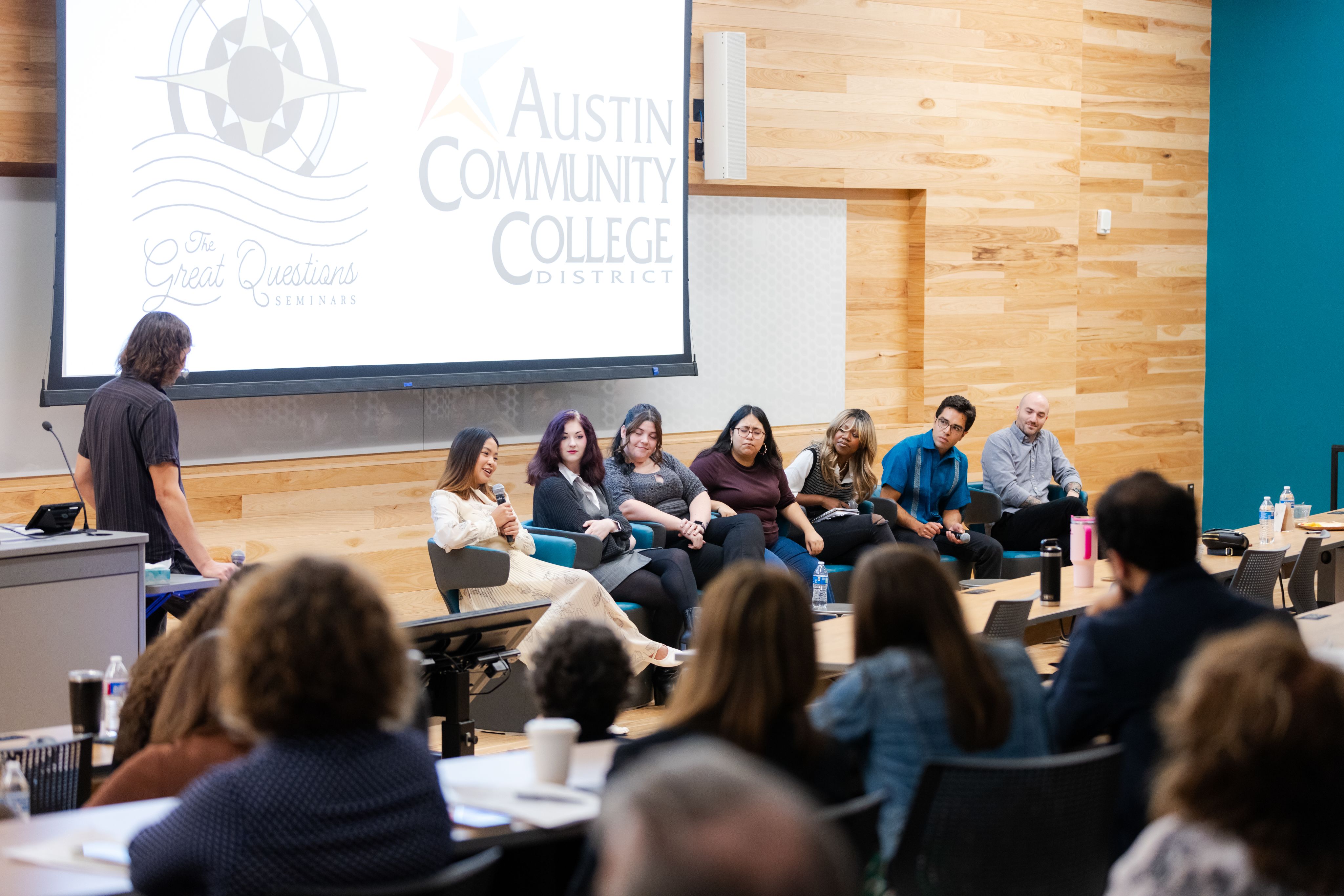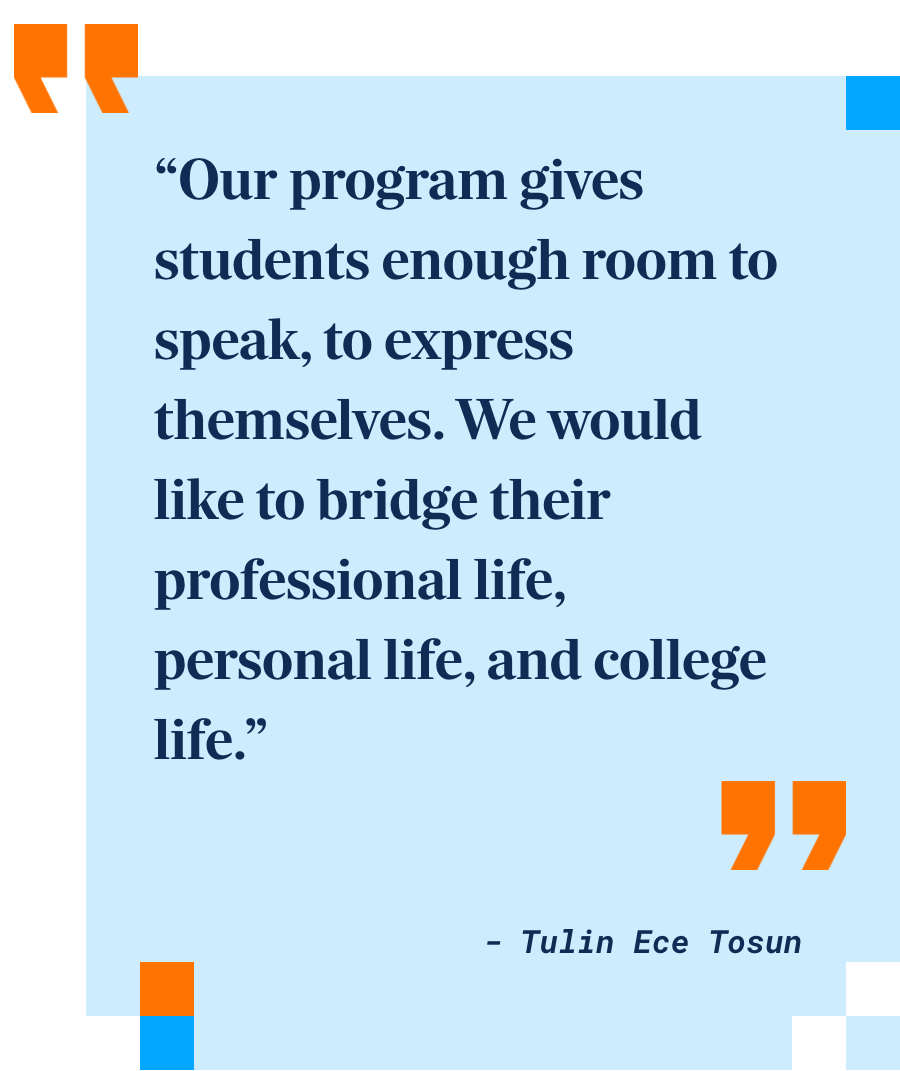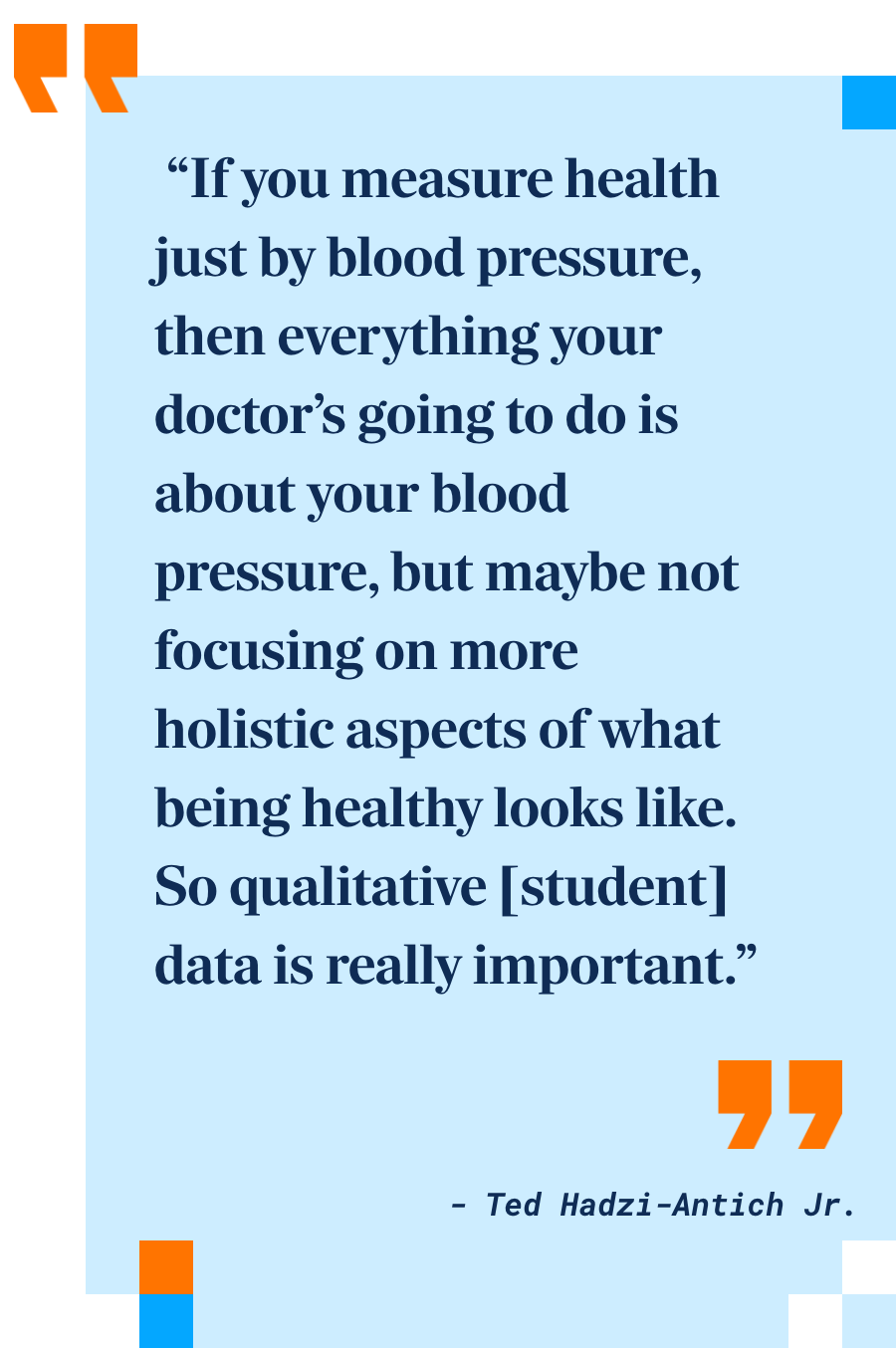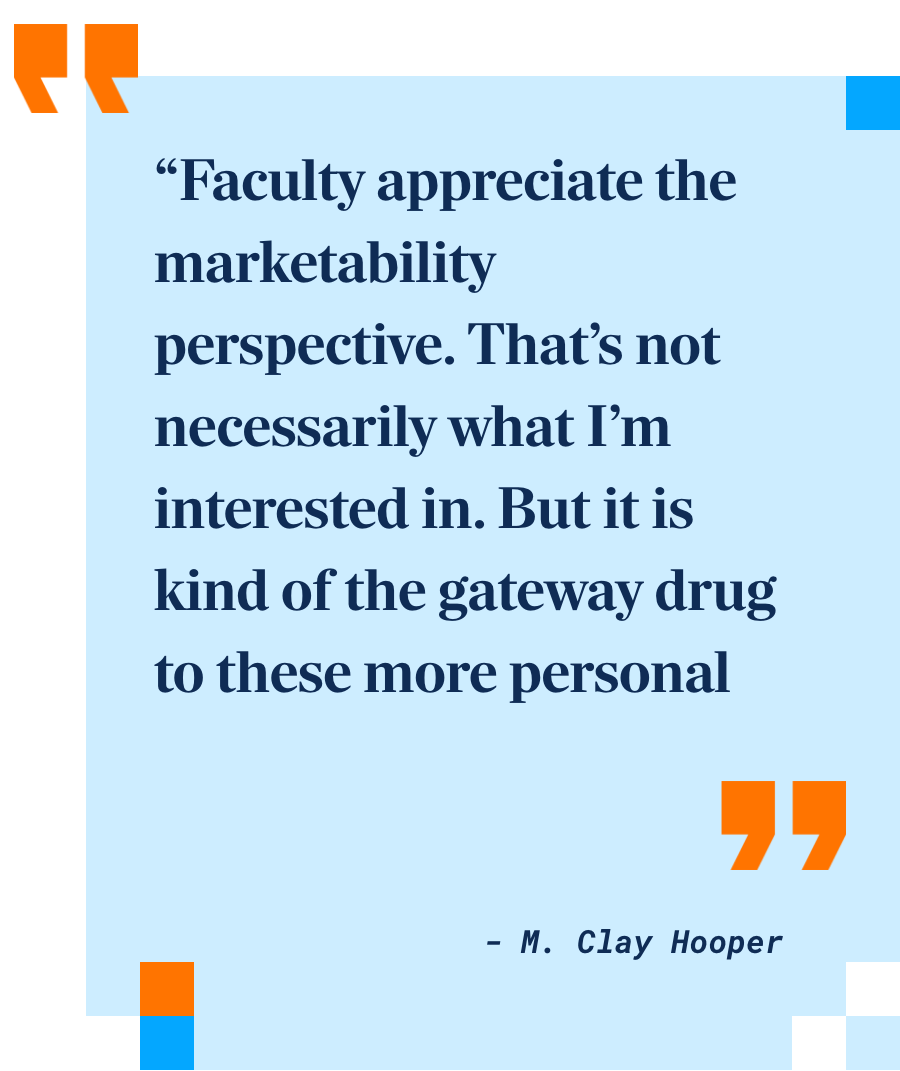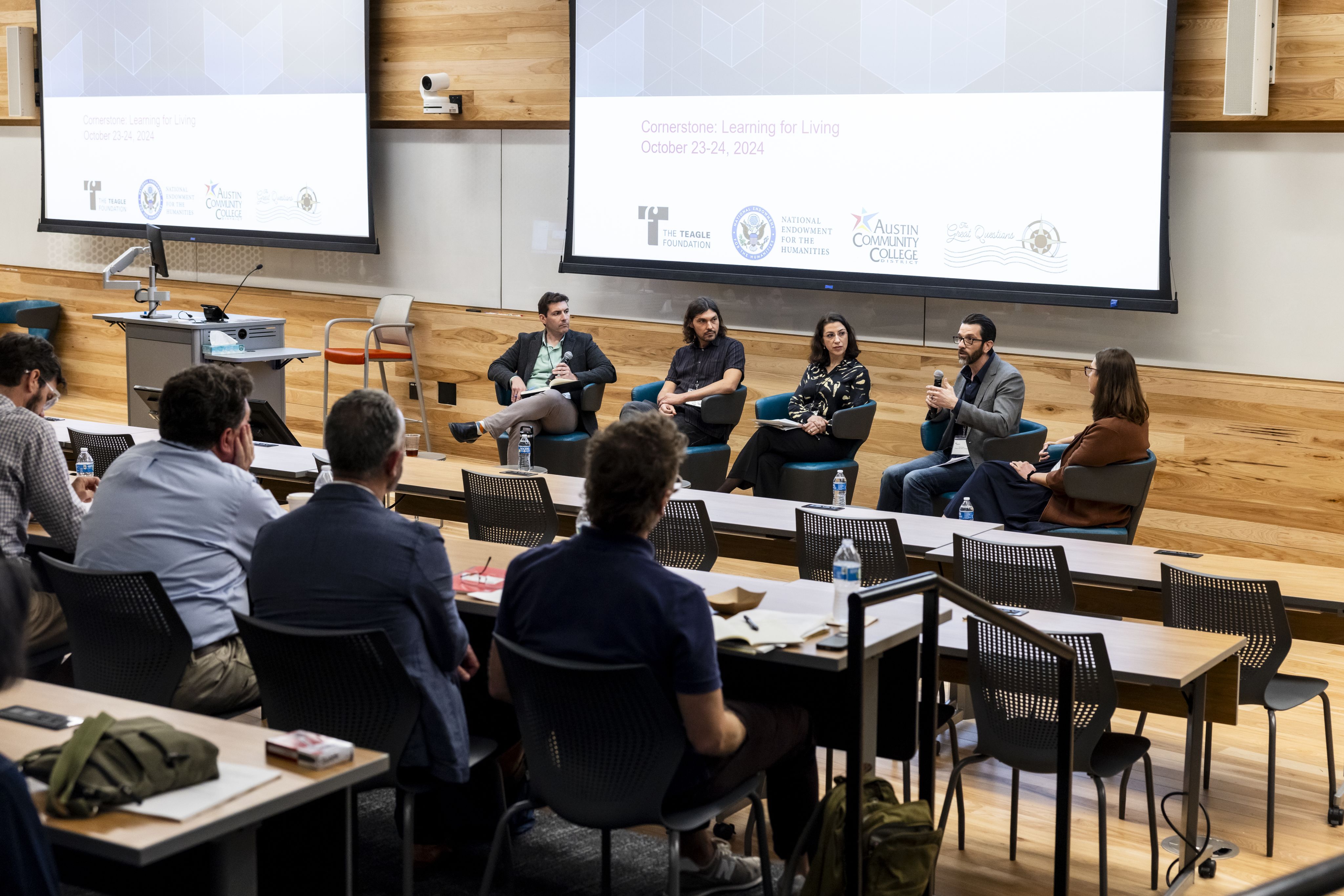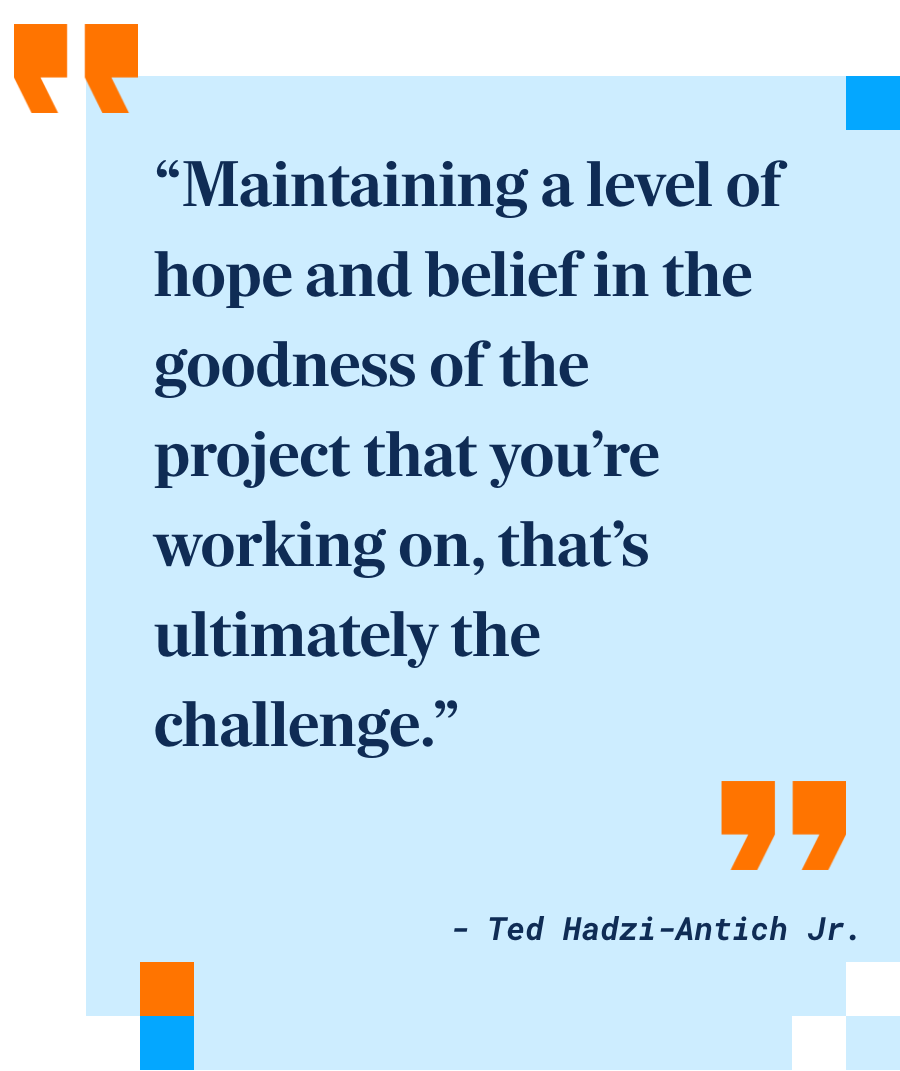Building Humanities Courses to Transform Students' Experience
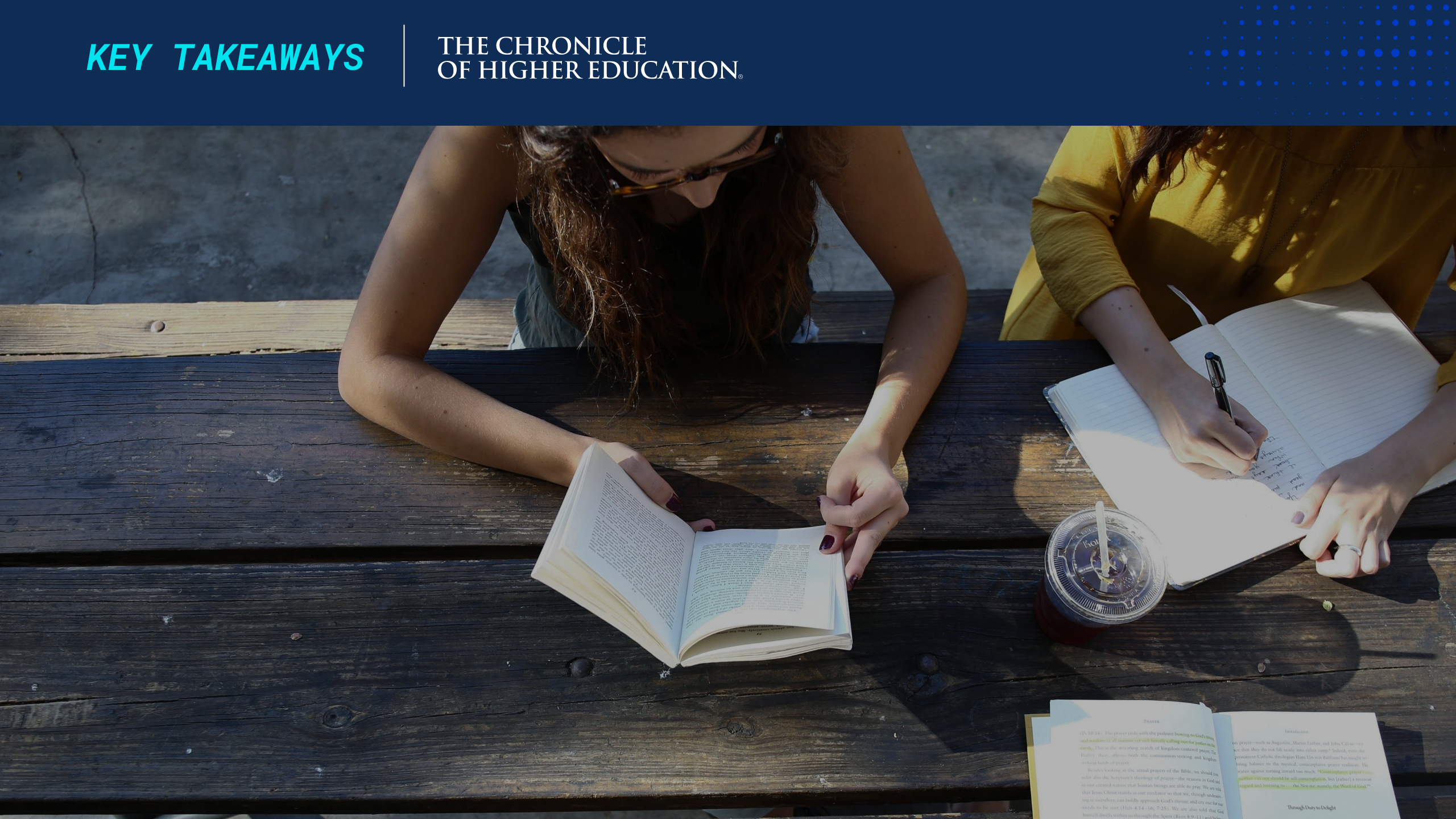
Speakers
Tulin Ece Tosun
Assistant Teaching Professor, Cornerstone Integrated Liberal Arts, at Purdue University
Ted Hadzi-Antich Jr.
Associate Professor of Government and Humanities at Austin Community College
M. Clay Hooper
Associate Professor of English at Prairie View A&M University
Amanda Tucker
Professor of English at the University of Wisconsin at Platteville
Shana Mao is a self-described shy student. But recently, a humanities course at her college in Texas helped her get out of her shell and exposed her to new ideas.
“I saw a lot of perspectives I’d never heard before or I was close-minded to,” she said about “Great Questions,” a seminar class at Austin Community College. “It really opened me to being more receptive and more empathetic.”
In late October, Mao shared her experience during a student panel at a conference organized by the Teagle Foundation as part of its work to bolster the role of the humanities in the college curriculum. The two-day event brought together department chairs, professors, and other academics from across the country to learn how to start or expand courses like “Great Questions.”
The consensus at the conference, which was held at Austin Community College’s Highland campus, was that while higher-education leaders are increasingly focusing on career outcomes, college students still need exposure to thought-provoking literature and to engage in conversations with their peers about such works.
A student needs an opportunity “to evolve to their higher self,” Monique Umphrey, provost of the college, told the attendees during the opening session. In a country where disinformation is widespread and easily accessible, she said, “We need the ability to think critically. It’s never been more vital.”
Roosevelt Montás (right) of Columbia U. talks with MIT's Joshua Bennett about the importance of the humanities during a Teagle Foundation conference.
Roosevelt Montás (right) of Columbia U. talks with MIT's Joshua Bennett about the importance of the humanities during a Teagle Foundation conference.
The conference, which also receives support from the National Endowment for the Humanities, is in its third year, and next year will be held October 16-17 at Vanderbilt University. It stemmed from a program at Purdue University called Cornerstone Integrated Liberal Arts.
The hallmark of the Purdue effort, which started in 2016 and helped reverse a decline in student interest in the humanities at the STEM-focused institution, is to have students read “transformative texts” and engage in discussion-based classes with tenure-track faculty members from a variety of academic areas. The two-semester course sequence is part of the university’s core curriculum and can lead to a certificate focused on communication, critical thinking, and related skills.
Other campuses represented at the conference have adopted the Cornerstone model or developed their own ways to integrate more humanities courses into general education or other parts of the curriculum.
While supportive of the approach, attendees did note challenges.
Some pointed out that it can be difficult to attract experienced faculty members to teach a first-year class, especially if they are from academic disciplines other than the humanities or are used to teaching lectures and worry they may struggle in a small class that hinges on student participation and discussion.
Decrying what he described as a “cult of expertise” in academe, Roosevelt Montás, a senior lecturer in American studies and English at Columbia University, said, “Disciplinary specification has eaten general education.”
A faculty member doesn't need to be an expert in The Odyssey or other seminal works to teach them, he said, but rather can be a “conductor of inquiry.”
Joshua Bennett, distinguished chair of the humanities and a professor of literature at the Massachusetts Institute of Technology, who joined Montas on a panel, agreed. He said instructors should embrace a “collective amateurism” with students in such classes, exploring a text on a personal level alongside them. What’s more, he said, creating such an atmosphere in the classroom can make students feel comfortable participating and making mistakes.
Later in the conference, during a panel moderated by Ian Wilhelm, a deputy managing editor at The Chronicle, participants discussed challenges like these as well as ways to get administrative buy-in and how to measure success.
The speakers were:
- Ted Hadzi-Antich Jr., an associate professor of government and humanities at Austin Community College and founder of the “Great Questions” course;
- M. Clay Hooper, an associate professor of English at Prairie View A&M University;
- Tulin Ece Tosun, an assistant teaching professor in Purdue’s Cornerstone program and its assistant director at the university’s Indianapolis campus; and
- Amanda Tucker, a professor of English at the University of Wisconsin at Platteville.
The transcript has been edited for length and clarity.
Ian Wilhelm: Tell us briefly about the work you’re doing on your campus related to expanding the humanities?
Amanda Tucker: I am co-director for the Helios program at UW Platteville. We’re a regional comprehensive university in a rural area, serving predominantly male students and a lot of first-gen and Pell-eligible students. Our students come in with a very transactional mentality toward college. They feel like it's necessary because they want to get a good job.
The Helios program asks: How can we make college fun? Play is a really important part of learning and education. Part of our focus is on a positive experience for students. The goal of our first-year seminar is to give everybody the joy of humanities-based learning, but also to focus on academic socialization. How do we help them with the invisible skills that are necessary to be successful in college, particularly around reading and note taking? How do we make them feel like they belong and deserve to be at an institution, and get them to even think about education as something beyond preparation for the work force?
M. Clay Hooper: I am at Prairie View A&M University, which is an HBCU outside of Houston. But here I represent not just my own institution, but the entire Texas A&M system. We have implemented a 12-hour humanities certificate that we call the Human Experience. And as you can imagine, doing that across a whole statewide system in a large state presents challenges. We've established some degree of commonality through a set of learning outcomes adopted by all 10 participating institutions. These outcomes stress taking humanities-based inquiry and applying it to topics and issues that are not always regarded as part of the humanities. We've taken that approach partly to market our program to a system that is not really humanities oriented. And it's helped us create buy-in.
We assess those outcomes through what we call transformative projects. Students are reading transformative texts, but then also engage in projects in these classes that ask them to take what they've learned through that process of humanities-based inquiry and apply it to things that we generally consider outside of the humanities. And we're in our second year of implementation.
Tulin Ece Tosun: In our classrooms, we have many students who are business majors, social-science majors, engineers and other STEM students. So the question is: How can we make them challenge themselves to read the difficult texts and question the world so that we can push them out of their comfort zones?
We want our students to be part of a community in our classrooms. By contrast, in an engineering class, it’s like 200 to 300 students; they are all on their computers. Sometimes those courses do not require attendance or participation, and they are in their own worlds.
In our classrooms, we have 30 students. Our program gives students enough room to speak, to express themselves. We would like to bridge their professional life, personal life, and college life.
Ted Hadzi-Antich Jr.: The project at Austin Community College and at the community colleges that we're working with through the Great Questions Foundation, is to make general education meaningful. Students have to come through our classes, so let’s make that an experience where they can grow as an individual or they can develop a relationship to beauty. I hope that the students at Austin Community College can fall in love with the things that we study. I want them to leave our classrooms being fuller human beings.
Wilhelm: I want to dig into how you measure success. Obviously, the courses are about the power of transforming students. But if I'm a bean-counter administrator, show me the proof that this is worth the institution’s investment.
Students from Austin Community College describe their experiences in the Great Questions course.
Students from Austin Community College describe their experiences in the Great Questions course.
Tucker: I'm going to be an outlier and say, I actually think assessment is fun. But that's me.
I work in an institution where I feel very fortunate that our administrators are interested in our students’ experience. Now, they're not going to fund us because of that. They're going to fund us based on retention. And so one thing that I would recommend is everybody gets data on first- or second-year retention for the students in your class compared to the overall student population. What we can show then is that last year there was a 7-percent positive difference for students who took our class being retained to their second year compared to overall, which is actually sizable.
What's also compelling is what's happening in the classroom. And one way that we can measure that is through the National Survey of Student Engagement, which a lot of institutions use, and is a key performance indicator of reflective and integrative learning. There are survey questions like, How frequently did you connect your learning to societal problems? How frequently are you provided a diversity of perspectives and assignments and readings? How are you examining the strengths and weaknesses of your own viewpoint?
We found not only did Helios students score significantly better than the students who aren't taking Helios, but they're significantly better than those at our peer institutions. And that is data that's exciting to administrators.
Hooper: We have assessment and measure retention. But one of our big goals is to raise the profile of the humanities within the Texas A&M system. We have a systemwide symposium for students to display their projects. One of our programs that I'm excited about is at Texas A&M University at San Antonio, where they have a thematically based version of the Human Experience certificate called Culture, Water, and Life. Students are taking a philosophy course around the theme of water within Western and non-Western philosophical traditions. They're taking a first-year seminar called “How the Toilet Changed the World.” And they're engaged with questions of access to sanitation and water within the borderlands. And then the next semester, they take an intro to drama course centered around a collection of Shakespeare adaptations by borderlands authors, and the students are going to produce their own play from one of these adaptations.
Hadzi-Antich: We've been collecting a bananas amount of data since 2017. We focus on qualitative data from our students. We gather periodic focus groups, trying to get a representative sample of students from a variety of different modalities and professors. We sit them in a room or on Zoom, and we have a conversation about their experience. And we do surveys at the end of each class, asking questions like, Do you feel this text spoke to you as an individual? Do you feel like this class is helping you develop skills that support success in other classes you might take?
We collect quantitative data, too, and we're focusing on one population within our Great Questions seminar and a couple of key metrics with respect to that population, which is first-time college students with fewer than 12 successful credit hours. This is the group that we are focused on because our class meets a mandate for student-success course requirements. And so we want to do an apples-to-apples comparison to ask: Does this really have the impact that we're claiming it does?
After years of this data, we see upper 90-percent persistence from the fall to the spring. We see transfer rates of around 44 percent for students that can successfully complete.
So now, there's a sense of what you measure becomes the value of what you're doing. If you measure health just by blood pressure, then everything your doctor's going to do is about your blood pressure, but maybe not focusing on more holistic aspects of what being healthy looks like. So qualitative data is really important. We don't want our students to just complete a class. We want our students to complete a class that's meaningful, where they're going to develop as a human being, see themselves as belonging in college, and be able to talk across differences.
During the Teagle event, M. Clay Hooper of Prairie View A&M U. discusses the Human Experience course he helped develop.
During the Teagle event, M. Clay Hooper of Prairie View A&M U. discusses the Human Experience course he helped develop.
Wilhelm: Let me take my bean-counter hat off and put on my tweed jacket to play the role of the fusty professor. I want to pick up on something that Professor Montas said earlier, that disciplinary specialization has eaten general education. I heard from some educators here that it can be a challenge to convince a senior professor to teach a general-education course like the courses you're describing.
Do you have tips for the folks who may be trying to get faculty from disciplines outside the humanities to teach these classes?
Hooper: We have this integrated humanities focus, and part of what that implies is close collaboration with faculty from nonhumanities disciplines. Faculty in these other disciplines understand that the humanities are important for the marketability of their students. They know that's what industry is telling them. Employers need students with adaptable skills that the humanities provide, like critical thinking and communication.
So these faculty appreciate the marketability perspective. That's not necessarily what I’m interested in. But it is kind of the gateway drug to these more personal and civic goals that we’ve discussed. And so that's the lure to draw them in.
Then we all collaborate, building course materials, projects, and approaches to reading that will engage students and help them grow, not just as technicians, but as human beings. For example, my colleague at Texas A&M at Texarkana worked closely with the nursing faculty to build new courses within their core curriculum that help their nursing faculty specifically engage with transformative texts in ways that apply to future nurses.
It has been really critical in breaking down some of those disciplinary barriers. A lot of times in the humanities, we have this little space that we're allowed to operate in, to do our separate thing. And we're always fighting for a bigger and better space. But to some degree that can be self-defeating because it just reaffirms disciplinary boundaries. When we reach out and build collaborative teams that break down those boundaries, it helps us kind of gain more resources for what we want to do and show to the administration the power of what we offer.
Wilhelm: What's the single biggest obstacle that keeps you up at night with your work in this area?
Tosun: The biggest challenge could be getting students to read the text. How can we make them read, and how can we create a community? We always sit in a circle. Everyone sees each other's faces so that creates a sense of familiarity. And then I always tell my students, I'm going to read Shakespeare out loud and let's see my acting skills, which I always fail at. They giggle. But I take the lead parts and I read out loud. When they see me struggling, then they are like, she's vulnerable. She's a professor and she's a human being. So they start reading, they take the lead parts. And it is OK to mispronounce a word, and it is OK to miss a line. Then they understand that reading is not a task. It becomes a joy, and it becomes unifying.
Hadzi-Antich: In The Odyssey, Penelope’s weaving the shroud for Odysseus. This is a great image of hope: You weave this thing, and it unravels, and you weave it again, and it unravels. I feel like the challenges that we face are like that. We put something really beautiful together and then we have a challenge that starts pulling on the strings. We’ve got to keep weaving it back together, and there's never going to be a moment where we don't need to pivot and address new challenges, whether they be funding concerns, or a change in a degree plan, or the legislature says something. Maintaining a level of hope and belief in the goodness of the project that you're working on, that's ultimately the challenge.
Tucker: One of the challenges scaling up a project like this is that faculty for the most part are already operating at or over capacity. Teaching has radically changed and it has taken more and more time to do well. One of my other roles is as a faculty associate for our center of teaching and learning, and I constantly am giving or going to professional development. And I hear so often, Here are the new 37 things you need to do if you really care about students. It's really hard to take on another thing to do for faculty when they're already feeling overworked and undervalued.
That said, one thing I want to highlight is that this has been such a joyful experience for the faculty who have bought into this. Yes, we need resources to fund faculty. But we don't exist by physical bread, right? We need the bread of knowledge. And we need spiritual substance. And I think that this provides that in a way that feels really good and enriching for your soul. I'm sorry if that sounds cheesy, but I do really believe that.
This Key Takeaways was produced by Chronicle Intelligence. Please contact CI@chronicle.com with questions or comments.
©2024 by The Chronicle of Higher Education Inc. All rights reserved. This material may not be reproduced without prior written permission of The Chronicle. For permission requests, contact us at copyright@chronicle.com.


